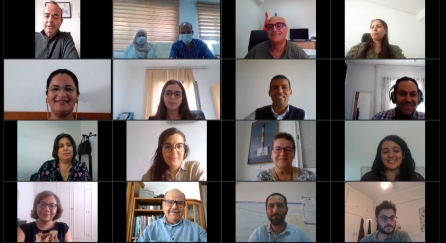Search
10/20: Launch of the IMAP-MPA Project in Tunisia
The Ministry of Local Affairs and Environment and the Specially Protected Areas Regional Activity Centre SPA/RAC organized a first online meeting to launch the activities of the IMAP-MPA project in Tunisia, which integrates the ecosystem approach principles to the development of marine protected areas.
The IMAP-MPA project “Towards achieving the Good Environmental Status of the Mediterranean Sea and Coast through an Ecologically Representative and Efficiently Managed and Monitored Network of Marine Protected Areas” is coordinated by the UNEP/MAP-Barcelona Convention Secretariat and executed by its Programme for the Assessment and Control of Marine Pollution in the Mediterranean (MED POL) and its Regional Activity Centre SPA/RAC. This project, funded by the European Union, covers a period of 42 months starting from August 2019.
The IMAP-MPA project aims at consolidating and supporting the Ecosystem Approach (EcAp) process for MPA management and sustainable development. The beneficiary countries of the project specific national activities are: Algeria, Egypt, Israel, Lebanon, Libya, Morocco, and Tunisia.
As for Tunisia, the first national meeting in the framework of the IMAP-MPA project was organized online on October 7th, 2020, in close collaboration with the Ministry of Local Affairs and Environment of Tunisia, with the participation of the concerned stakeholders, including representatives of national authorities and institutions, as well as civil society organizations.
The event was an opportunity to discuss the project activities in Tunisia, in particular the national integrated monitoring programme of the marine environment and the activities related to the initiation of the implementation of the management plan of the north-eastern islets of the Kerkennah Archipelago.
Concerning the monitoring programme, the meeting selected the sites of Kerkennah (north-eastern islets) and Kuriat, both future marine protected areas and already benefiting from management measures, and the Gulf of Gabes, which is an area under high pressure. The comparison of monitoring results will be used to better understand the impacts of human activities on the marine environment and to set up or adapt management measures as needed. This approach is in line with the Integrated Monitoring and Assessment Programme (IMAP) of the Mediterranean Sea and Coast (Decision IG.22/7) adopted in 2016, by the 19th Conference of Parties to the Barcelona Convention.
Discussions also focused on the means to be deployed to coordinate and sustain all activities related to the monitoring of the marine environment in Tunisia within the framework of the IMAP regional process.
Thus, it was decided to set up, under the aegis of the Ministry of Local Affairs and Environment, a permanent national steering committee for the IMAP programme in Tunisia, including three working groups on: Pollution and Marine Litter, Biodiversity and Fisheries, Coast and Hydrography. The national IMAP committee should involve all governmental departments and institutions concerned by these topics, as well as NGOs and resource persons.
The committee will, among other things, ensure a synergistic and coordinated implementation of the activities of the IMAP-MPA project and those of the upcoming EcAp MED III project "The effective implementation of the ecosystem approach based on integrated monitoring and assessment of the Mediterranean Sea and its coasts in synergy with the EU Marine Strategy Framework Directive (MSFD)", of which Tunisia is also beneficiary.
Finally, it was recommended to create a national platform for data banking, exchange and communication and to further invest in capacity building of the involved stakeholders.
For more information about the IMAP-MPA project: https://bit.ly/3iI9v36




Find Us On...